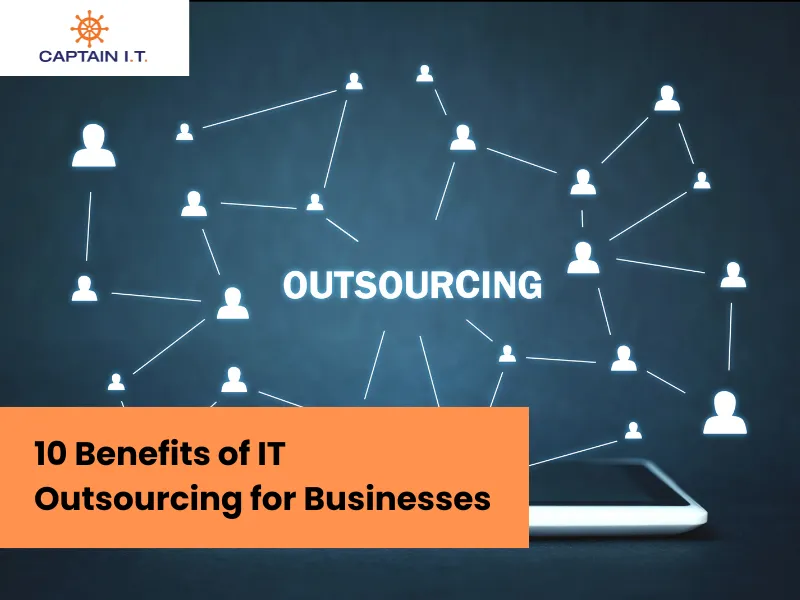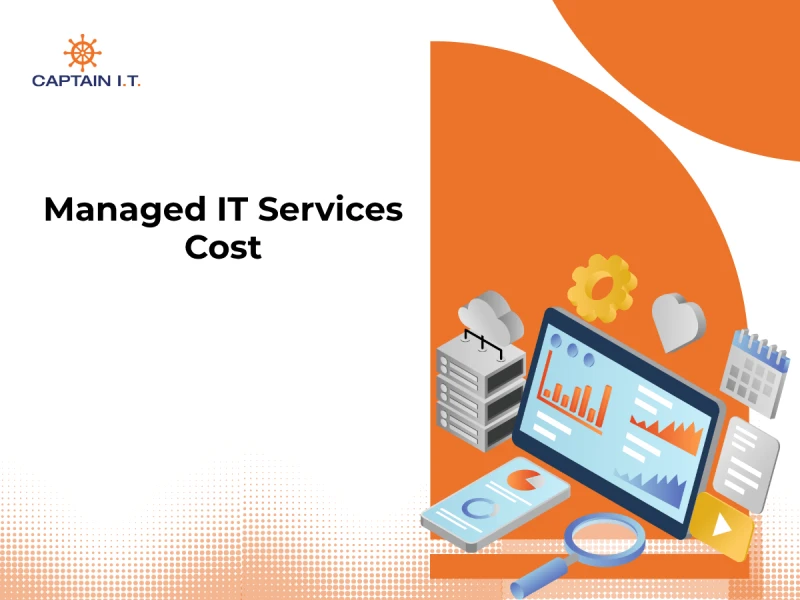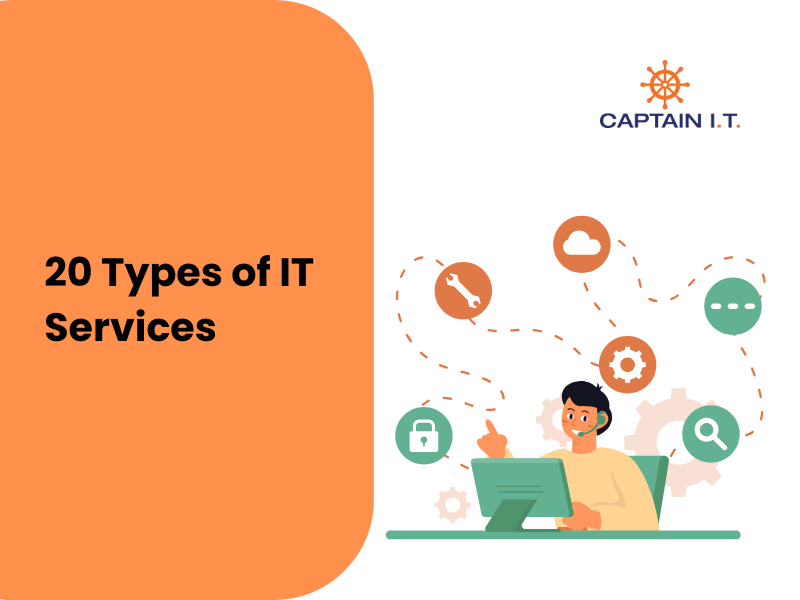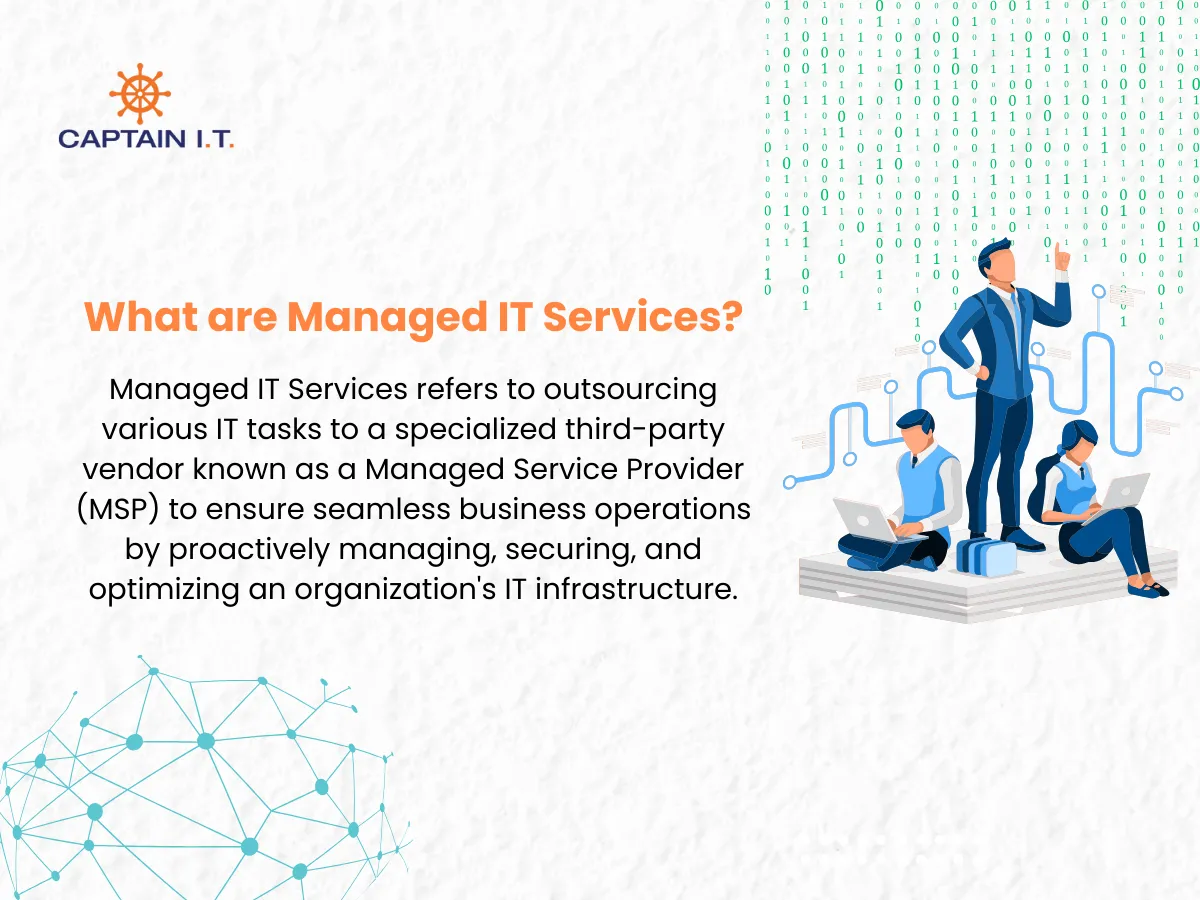IT consulting is expert advice that helps organizations optimize their technology infrastructure and strategies. IT consultants work closely with businesses to enhance productivity by improving IT workflows, strengthening security through comprehensive risk management, and driving innovation by integrating advanced technologies.
Businesses need IT consulting services and Managed Service Providers (MSPs) to navigate the complexities of digital transformation and maintain a competitive edge. With rapidly evolving technology landscapes, organizations rely on consultants to identify challenges, recommend effective solutions, and implement strategies that support growth, efficiency, and resilience. This collaboration empowers companies to focus on their core goals while confidently leveraging technology to achieve sustainable success.
What does an IT Consultant do?
An IT consultant handles business technology needs by solving system issues and guiding digital improvements. These professionals assess current systems to identify inefficiencies and recommend tailored digital solutions aligned with organizational goals. By addressing operational gaps and reviewing infrastructure readiness, they ensure each recommendation supports performance and scalability.
Their role connects strategic goals with the right tools, ensuring every solution supports business growth. Through a blend of advisory planning and technical execution, IT consultants turn business needs into actionable plans and manage implementation to deliver measurable results.

Some of the key roles and responsibilities of an IT consultant are:
- Assess IT infrastructure and identify system-level issues
- Recommend technology solutions based on business needs
- Develop strategic IT roadmaps and timelines
- Oversee implementation with internal teams and vendors
- Ensure security, compliance, and data protection
An IT consultant’s work may emphasize strategic planning, technical execution, or a combination of both, based on project needs. Strategic tasks guide long-term IT direction, investment alignment, and leadership enablement, while technical tasks involve implementing systems, resolving performance issues, and managing vendor tools. By balancing both areas, IT consultants deliver outcomes that are goal-driven and operationally effective.
Types of IT Consulting Services
Different types of IT consulting services range from high-level strategy and systems architecture to cloud environments, data intelligence, and security frameworks. These service segments work collectively to support digital transformation, operational efficiency, and risk management in business environments of any scale.
IT Strategy Consulting
For companies navigating digital growth, IT strategy consulting sets the direction. It aligns technology with business goals through services like roadmap development, investment planning, and transformation oversight. This approach helps eliminate short-term fixes and fragmented initiatives.
Strategic consultants guide resource allocation, improve governance, and support long-term scalability. Organizations benefit from higher ROI, unified operations, and a future-ready IT framework.
IT Architecture Consulting
When scalability challenges arise, architecture consulting builds the solution framework. It structures how technologies interact by designing infrastructure layouts and integration models. This service resolves system incompatibility and platform sprawl.
A cohesive architecture reduces friction, improves system uptime, and enables faster deployment. It supports technology adoption while future-proofing enterprise infrastructure.
Cloud Solutions Consulting
As businesses scale, cloud consulting ensures secure, efficient transitions. Services include readiness assessments, migration planning, and hybrid architecture design. It addresses issues like high infrastructure costs and limited scalability.
Cloud consulting delivers flexible operations, remote accessibility, and lower IT overhead. Businesses gain agility and may reduce costs by up to 50% post-migration.
Data Analytics Consulting
Organizations sitting on large volumes of unstructured data turn to analytics consulting for clarity and value extraction. This service builds data pipelines, implements BI platforms, and develops models that predict trends and guide strategic decisions. It tackles common issues such as siloed data, inconsistent KPIs, and unreliable reporting.
With real-time insights, organizations improve decision speed and accuracy. They gain visibility into KPIs and strengthen operational forecasting across functions.
IT Security Consulting
When risk exposure increases, IT security consulting protects systems and data. This service identifies threats, establishes compliance frameworks, and develops policies to prevent breaches. It covers infrastructure audits, endpoint protection, identity access controls, and regulatory mapping.
Effective security consulting reduces vulnerability windows, strengthens stakeholder trust, and keeps the organization audit-ready. Companies report fewer incidents and greater confidence in system integrity.
What are the Benefits of IT Consulting Services?
The benefits of IT consulting services are expertise and specialized knowledge, cost-effective solutions, enhanced security and compliance, increased efficiency and productivity, scalability and flexibility, strategic IT planning, and reduced downtime. IT consulting helps organizations harness technology effectively to overcome challenges, optimize resources, and maintain a competitive advantage in dynamic markets.

Below are the 7 key benefits of IT consulting services:
- Access to expertise and specialized knowledge
IT consultants bring a deep, current understanding of emerging technologies and best practices. Their expertise enables businesses to apply the right solutions efficiently, accelerating innovation while avoiding costly trial and error. - Cost-effective technology management
By leveraging IT consulting, businesses avoid the overhead of full-time staff while optimizing investments. Consultants identify inefficiencies and recommend budget-friendly solutions, helping companies reduce costs on salaries, training, and unnecessary technology. - Enhanced security and compliance
IT consulting prioritizes risk management and data protection. Consultants implement robust cybersecurity measures and compliance frameworks, protecting organizations from breaches and regulatory penalties, thus safeguarding reputation and customer trust. - Improved efficiency and productivity
Consultants analyze workflows and implement automation tools that eliminate bottlenecks. This optimization streamlines the process, reduces manual effort, and boosts employee productivity, leading to faster project delivery and operational excellence. - Scalability and flexibility for growth
IT consulting supports business growth by designing scalable and adaptable technology infrastructures. Consultants ensure systems can evolve with market demands, enabling companies to expand seamlessly without disruption. - Strategic IT planning for future readiness
Consultants develop clear IT roadmaps aligned with business goals. This forward-looking planning helps organizations anticipate challenges, align stakeholders, and make informed decisions that sustain long-term success. - Reduced downtime and operational resilience
Effective IT consulting minimizes system failures and downtime through proactive IT management and rapid incident response. This ensures continuous operations, protects the revenue, and maintains customer satisfaction.
What Are the Probable Disadvantages of IT Consulting Services?
The probable disadvantages related to IT consulting include high costs for short-term engagements, data security, and confidentiality risks, temporary involvement, a lack of deep internal understanding, and resistance from internal teams. Each of these challenges can impact the overall effectiveness and smooth integration of consulting efforts within a business.
- High Cost for Short-Term Engagements
Short-term consulting projects often involve significant fees that may not proportionally translate into long-term benefits, making the investment costly for some businesses. - Data Security and Confidentiality Risks
Engaging external consultants requires sharing sensitive business information, which can introduce risks related to data breaches or confidentiality lapses. - Temporary Involvement
IT consultants typically engage for limited periods, which may lead to a lack of sustained support or follow-through after project completion. - Lack of Deep Internal Understanding
Consultants may not fully grasp the intricate culture, processes, or history of the organization, potentially leading to less tailored or effective solutions. - Resistance from Internal Teams
Internal staff may perceive consultants as outsiders, creating resistance that hinders collaboration, knowledge transfer, and project success.
How to Mitigate the Disadvantages of IT Consulting Services?
Understanding the potential drawbacks of IT consulting allows businesses to proactively manage risks and improve outcomes. Here are key approaches to mitigate common challenges:
- Manage Costs Through Clear Scoping and ROI Analysis
Define project scope and deliverables upfront to avoid scope creep and unexpected expenses. Conduct a cost-benefit analysis to ensure that short-term engagements align with long-term business value. - Protect Data with Robust Security Protocols
Establish strict confidentiality agreements and limit data access to essential personnel. Use secure communication channels and monitor compliance to safeguard sensitive information. - Plan for Knowledge Transfer and Ongoing Support
Include transition phases in consulting contracts to facilitate thorough knowledge transfer. Consider extended support agreements or internal training programs to maintain continuity after consultants exit. - Foster Cultural Integration and Context Building
Encourage consultants to spend time learning organizational culture, workflows, and history. Facilitate open communication channels between consultants and internal teams to improve solution customization. - Engage Internal Teams Early and Transparently
Involve key staff members in project planning and decision-making to build trust. Address concerns openly and position consultants as collaborators rather than external threats to reduce resistance.
When Should You Hire An IT Consulting Company?
You should hire an IT consulting company when your business faces specific challenges such as growth and scaling issues, persistent IT downtime, cybersecurity concerns, technology transitions, gaps in internal expertise, or budget constraints. Recognizing these triggers helps ensure timely intervention and maximizes consulting value from your chosen MSP.
- Business Growth and Scaling Challenges
When your organization experiences rapid growth or plans to scale, IT consultants help design scalable infrastructures and processes to support expanding operations without disruption. - Frequent IT Downtime and Inefficiencies
Persistent system failures and operational bottlenecks signal the need for expert assessment and optimization to improve uptime and workflow efficiency. - Cybersecurity and Compliance Concerns
Heightened regulatory requirements or security threats require specialized consulting to implement robust protections and maintain compliance. - Transition to Cloud or New Technologies
Migrating to cloud platforms or adopting new technologies can be complex; consultants provide guidance to ensure smooth, risk-minimized transitions. - Lack of In-House IT Expertise
When your internal team lacks the skills or capacity to handle complex IT projects, external consultants fill critical knowledge and resource gaps. - High IT Costs and Budget Constraints
If IT expenses are rising unsustainably, consultants can identify cost-saving opportunities and optimize technology investments to fit budget limits.
What Skills Should An IT Consultant Have?
An effective IT consultant needs a blend of technical expertise, business acumen, and interpersonal skills to deliver impactful solutions. Key skills include:
- Technical Proficiency: Deep understanding of hardware, software, networks, and cloud technologies to design and implement robust systems.
- Analytical Thinking: Ability to assess complex problems, identify root causes, and develop strategic solutions.
- Project Management: Skills to plan, coordinate, and deliver IT projects on time and within budget.
- Communication: Strong verbal and written communication for clear stakeholder engagement and documentation.
- Business Understanding: Insight into how technology impacts business goals and operations.
- Adaptability: Flexibility to keep pace with evolving technologies and changing client needs.
- Security Awareness: Knowledge of cybersecurity principles to protect data and infrastructure.
Developing these skills is essential for anyone interested in pursuing a career. You should gain more insights on how to become an IT consultant and build a strong foundation that helps you grow and land more opportunities.
How Much Do IT Consulting Services Cost?
The cost of IT consulting services ranges from $100 to $350 per hour, based on industry, project scope, and expertise required. Specialized consulting in sectors like finance or healthcare often commands higher fees due to regulatory complexity. Project-based costs can range from $10,000 for small engagements to over $250,000 for enterprise-scale digital transformation.
Key factors influencing cost include the consultant’s experience, project complexity, geographic location, and required technology stack. Additional costs may arise from travel, licensing fees, or extended support agreements. Understanding these variables helps businesses budget effectively and choose the right consulting model for their needs.
How to Choose the Right IT Consulting Firm?
Choosing the right IT consulting firm requires selecting the MSP that excels in IT strategy, cybersecurity, cloud and email migrations, server and network design, compliance standards, and unified communications, ensuring your technology initiatives succeed and align with business goals.
- Evaluating Expertise and Industry Experience
Expertise tailored to your industry is essential because technology needs vary widely across sectors. A firm with relevant industry experience understands unique challenges and regulations, enabling it to provide targeted, effective solutions. - Checking Client Testimonials and Case Studies
Past performance indicates future success. Reviewing client testimonials and detailed case studies helps you verify the firm’s ability to deliver results, anticipate challenges, and apply practical solutions in real-world scenarios. - Understanding Their Approach to Problem-Solving
A strong consulting partner aligns with your business goals and culture. Understanding their project management style, communication practices, and flexibility ensures they can deliver outcomes that fit your company’s vision and values. - Ensuring Scalability and Long-Term Partnership
Technology needs evolve as your business grows. Choosing a firm that offers scalable solutions and demonstrates a commitment to long-term partnership helps maintain continuity and adaptability through future expansions or shifts. - Pricing and Budget Considerations
Transparent pricing models prevent unexpected costs. Evaluating fee structures upfront, including hourly rates, fixed fees, or retainer models, allows you to select a firm that fits your budget without sacrificing quality. - Security and Compliance Standards
Prioritize firms with proven expertise in risk assessments, security breach management, and compliance with industry regulations like HIPAA, CMMC, or ISO certifications. A strong security posture ensures your data and operations remain protected.
Key Criteria to Evaluate IT Consulting Firms
| Criteria | What to Look For | Why It Matters |
| Expertise and Industry Experience | Proven experience in your specific industry and technologies | Ensures tailored solutions and faster problem-solving |
| Client Testimonials and Case Studies | Positive reviews and detailed success stories | Validates reliability and outcome consistency |
| Problem-Solving Approach | Alignment with your business goals and clear communication | Supports smoother project execution and collaboration |
| Scalability and Long-Term Partnership | Ability to support growth and adapt to evolving needs | Maintains continuity and supports future expansion |
| Pricing and Budget | Transparent and flexible pricing models | Avoids surprises and ensures financial fit |
| Security and Compliance | Certifications and proven security practices | Protects data and ensures regulatory compliance |
Future of IT Consulting
The future of IT consulting revolves around AI, cloud computing, enhanced cybersecurity, cloud computing, and shifting business needs. The future of IT consulting is poised to transform business efficiency and innovation, with Managed Service Providers like Captain IT leading the way by delivering advanced technology solutions that streamline operations and enhance competitiveness. As digital transformation accelerates, IT consultants will play a critical role in integrating emerging technologies, optimizing infrastructure, and securing business environments.
Smarter Operations Through AI and Automation
IT consultants implement AI-powered tools such as robotic process automation (RPA), intelligent chatbots, and predictive analytics to automate repetitive tasks and streamline workflows. This reduces human error and accelerates processes like customer support, inventory management, and demand forecasting.
By enabling these smarter operations, businesses experience lower labor costs, faster turnaround times, and improved accuracy, which collectively boost productivity and free staff to focus on innovation.
Scalable Infrastructure with Cloud and Edge Support
Consultants design hybrid cloud and edge computing architectures that allow data processing closer to end users, improving application responsiveness for IoT devices, remote offices, and mobile workforces. They guide cloud migration strategies and implement scalable platforms like AWS, Azure, or Google Cloud tailored to business needs.
This scalable infrastructure reduces downtime, cuts capital expenditures on physical hardware, and supports rapid growth by allowing businesses to add resources on demand without service interruption.
Better Security Planning
IT consultants conduct thorough risk assessments and implement multilayered security measures, including zero-trust models, endpoint protection, and continuous monitoring. They also ensure compliance with standards like HIPAA, GDPR, or CMMC, depending on industry requirements.
These proactive security plans reduce breach incidents, help avoid costly fines, and maintain customer trust by safeguarding sensitive data and critical systems.
Turning Business Data into Better Decisions
IT consultants develop data lakes, business intelligence dashboards, and machine learning models that turn raw data into actionable insights. They help businesses analyze sales trends, customer behavior, and operational metrics in real-time.
This data-driven approach improves forecasting accuracy, optimizes inventory and resource allocation, and enhances personalized marketing strategies, leading to increased revenue and customer satisfaction.
What Types of Businesses Should Hire IT Consultants?
Small businesses, mid-sized companies, and large enterprises should hire IT consultants for their business. Small businesses often lack the budget or in-house expertise to manage IT effectively. Hiring a consultant allows them to set up secure, efficient systems without the cost of a full-time IT team. Mid-sized companies benefit from IT consultants as they scale, helping to streamline operations, improve infrastructure, and plan for future growth. Large enterprises typically engage consultants for specialized needs such as cloud migration, cybersecurity strategy, or compliance support, where expert guidance ensures accuracy and efficiency. No matter the size, businesses that want to improve performance, reduce risk, or align technology with their goals should consider IT consulting. Captain IT provides tailored IT consulting services to businesses across Southern California helping each client make confident, strategic technology decisions.





















